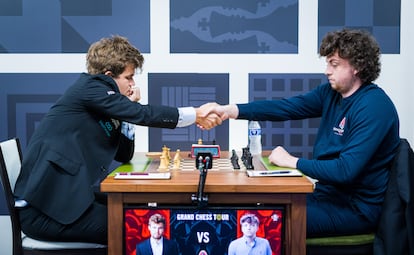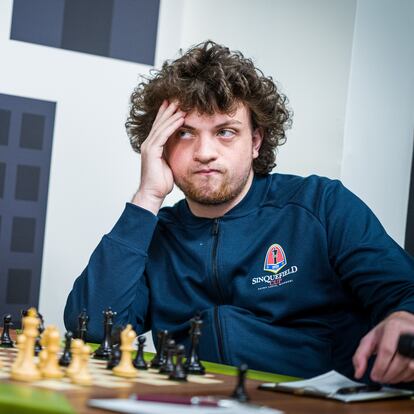Chess champion Carlsen found innocent and guilty at the same time after accusing rival Niemann of cheating
The FIDE’s Ethics and Disciplinary Commission has sentenced the Norwegian player to pay €10,000 for withdrawing from the 2022 Sinquefield Cup without a valid reason, but acquitted him of other charges

Magnus Carlsen withdrew without a valid reason from the 2022 Sinquefield Cup after losing to Hans Niemann and accusing him of cheating without evidence; and for this withdrawal he has been fined €10,000 ($10,800). But he is not guilty of unfounded accusations or of attacking the American player’s honor or damaging the prestige of chess. These are the conclusions of the Ethics and Disciplinary Commission (EDC) of the International Chess Federation (FIDE), which highlighted the importance of being prudent due to the damage that the Norwegian’s absence from tournaments would cause.
The 15-page decision reflects the chronological facts precisely, although it later omits some very relevant ones when explaining the final verdict. Niemann beat Carlsen with the black pieces on September 4, 2022, at the Sinquefield Cup, a very prestigious annual tournament in St. Louis (Missouri) where rigorous preventive anti-cheating measures had been previously taken: daily inspections of the playing area; players being scanned with metal detectors before entering the playing area; as well as random searches after the games finished; players were not allowed to bring electronics, watches, pens; onsite arbiters observing players during play; the entire playing area was covered by cameras used for live broadcast, no spectators were allowed in the playing area, with limited access to external VIPs and media; and all games were analyzed by Professor Kenneth Regan, considered the world’s leading expert in detection, using his statistical algorithm.
The three EDC members who drafted the decision — Yolander Persaud-Sammy of Guyana, Khaled Arfa of Tunisia and Pedro Domínguez of the Dominican Republic — noted the message that Carlsen tweeted after announcing his withdrawal from the tournament that same night, instead of using the discreet channels established by FIDE to report alleged cheating without causing a scandal (by confidentially filling out and sending a specific form): “I prefer really not to speak. If I speak, I am in big trouble,” emulating an identical phrase from the soccer coach (whom Carlsen is very fond of) José Mourinho in 2014 when his then team, Chelsea, lost to Aston Villa after a disallowed goal and three red cards.
Two days later, Niemann, who was 19 years old at the time, acknowledged in an interview that he had cheated in online games, but said he had never in in-person tournaments, when he was 12 and 16 years old. Carlsen reacted by switching from a cryptic tone to a direct accusation, stating he believed Niemann had “cheated more often and more recently than he has admitted,” without clarifying whether he was also referring to over-the-board tournaments. The Scandinavian’s confidence was most likely due to privileged information: two weeks earlier, the online chess platform Chess.com (which today claims to have more than 150 million users) had acquired Chess24, in which Carlsen was a majority shareholder. On September 26, the Norwegian player reaffirmed himself in writing and revealed that he had seriously doubted whether to participate in the tournament upon seeing Niemann on the player list because he knew of his previous cheating. On October 4, Chess.com published a long report detailing that Niemann had not only cheated online until he was 16 but also two months after turning 17. For reasons that are not explained, the EDC decision highlights this point repeatedly, without mentioning at any time that in the U.S. the age of majority is 18.
On its own initiative, the FIDE Fair Play Commission (FPL) opened a case against Carlsen, concluded that he had accused without evidence and raised the matter to the EDC in case the facts were worthy of sanction. Carlsen claimed helplessness because the case was sub iudice (Niemann had sued Carlsen in a Missouri court for $100 million for each of the four accusations against him), he challenged several members of the FPL committee, who had previously had disagreements with him, and argued that the FPL investigation had been “incomplete.” The EDC now agrees with the Norwegian on this point and emphasizes that it does not investigate, it only passes judgment; it is the FPL that must investigate. However, the EDC does not explain why it did not ask the FPL to reopen the investigation to make it more rigorous during the six-month pause that the EDC took while waiting for the Missouri court to resolve the lawsuit.
In the considerations prior to the decision, the EDC document highlights that the lawsuit in Missouri was settled out of court after Niemann appealed a first acquittal: Carlsen acknowledged that there was no cheating in the Sinquefield Cup game and withdrew his refusal to return and play against Niemann; Chess.com stressed that no signs of cheating had been found in live games and reinstated Niemann on its platform; Niemann withdrew his lawsuit. Neither party has confirmed or denied that Carlsen paid Niemann as a secret part of the agreement, although all the experts consulted consider it very likely.
The ECD decision also mentioned a statement by the president of FIDE, Arkady Dvorkovich, to the EDC regarding any possible sanction, “where the EDC Chamber must be cautious not to cause harm to the organizers and followers of FIDE events and tournaments where the strongest chess player in the world and the current World Cup winner should be present, and by not sending wrong messages to the large public that the top level is full of violations of fair play.”
Carlsen’s allegations contained in the ruling are contradictory and imprecise. The general opinion is that Carlsen played that game well below his level, too influenced by the awareness that his rival had cheated in online games when he was a minor. A significant fact is that all the coaches Niemann has had since he was a child highlight his enormous talent and his emotional imbalance, which would explain the great irregularity in his results.
The EDC decision chided Carlsen for never sending them the evidence of the alleged cheating. However, he was found not guilty of “reckless or manifestly unfounded accusation of chess cheating” on the grounds that this was an intermediate case in the sense that Niemann had admitted to earlier online cheating. The decision argued that Mourinho’s phrase, tweeted by Carlson, did not necessarily imply an accusation of cheating which, according to them, Carlsen did not make clearly until after Niemann had admitted to having done it online years ago. The decision also did not mention that Chess.com had banned the American player from playing on its platform for two years.
Even more surprising is the explanation for declaring Carlsen “not guilty” of attacking Niemann’s honor. The decision recalled Article 11.9 of their Disciplinary Code: “Any person who attempts to undermine the honor of another person subject to the Code in any way, especially by using offensive language, gestures or signs.” But then the verdict claimed there was no evidence that Niemann’s honor has been undermined in this case; without mentioning, for example, a fact that is mentioned in the chronology of the first pages: two weeks after losing to Niemann in Saint Louis, Carlsen played against him in an online game in the Julius Baer tournament; the Norwegian made his first move and walked away. In chess, this type of behavior (as well as not shaking your opponent’s hand at the beginning) has always been considered a very serious lack of respect.

The reasoning for considering Carlsen “not guilty” of damaging the prestige of chess is an application of a famous saying: let people talk about me even if they are saying bad things. The EDC recognized that the scandal was huge. Tesla and X owner Elon Musk fueled the controversy by suggesting that Niemann had used anal balls to cheat (through vibrations in Morse language sent by an accomplice who followed the game live with the help of powerful computers); Niemann replied that he was willing to play naked. However, the EDC felt that the great publicity that chess received for months was more important.
Carlsen is only “guilty” of withdrawing from the tournament without a valid reason because he did not follow FIDE’s recommendation of discreetly denouncing the alleged cheater through established channels, without publicly putting him at the horses’ feet. But he was only fined €10,000 (without any sporting punishment) for the following reasons: he has no criminal record; the FPL investigation was incomplete; there was an out-of-court agreement between the parties; and President Dvorkovich is right when he points out the harm to chess of Carlsen not playing tournaments.
The Norwegian, who renounced the world title in classical (slow) chess but remains number one, will compete this Christmas in Uzbekistan at the World Championships in the fast and blitz chess modalities. His reaction upon hearing the decision was: “I feel relieved that the case is over. There were much worse scenarios. If they sanctioned me from sports, I would have had to play only online.” However, Niemann, who has not yet said anything, has 21 days to appeal.
FIDE published the decision on Wednesday afternoon on its official website without announcing it on its social media or sending any notification to accredited journalists, whom it had informed in recent days about various competitions. Its executive director, Emil Sutovsky, who is very active on Twitter, has not published any comments either.
Sign up for our weekly newsletter to get more English-language news coverage from EL PAÍS USA Edition
Tu suscripción se está usando en otro dispositivo
¿Quieres añadir otro usuario a tu suscripción?
Si continúas leyendo en este dispositivo, no se podrá leer en el otro.
FlechaTu suscripción se está usando en otro dispositivo y solo puedes acceder a EL PAÍS desde un dispositivo a la vez.
Si quieres compartir tu cuenta, cambia tu suscripción a la modalidad Premium, así podrás añadir otro usuario. Cada uno accederá con su propia cuenta de email, lo que os permitirá personalizar vuestra experiencia en EL PAÍS.
¿Tienes una suscripción de empresa? Accede aquí para contratar más cuentas.
En el caso de no saber quién está usando tu cuenta, te recomendamos cambiar tu contraseña aquí.
Si decides continuar compartiendo tu cuenta, este mensaje se mostrará en tu dispositivo y en el de la otra persona que está usando tu cuenta de forma indefinida, afectando a tu experiencia de lectura. Puedes consultar aquí los términos y condiciones de la suscripción digital.









































